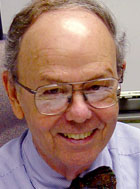Emil R. Unanue, M.D., has been named the Paul and Ellen Lacy Professor of Pathology.
Unanue recently stepped down after 21 years as head of the Department of Pathology and Immunology. The chair is named for Unanue’s predecessor as department head, Paul Lacy, M.D., Ph.D., and his wife, Ellen.

“I can think of no one more appropriate to be honored with the Lacy professorship,” said Skip Virgin, M.D., Ph.D., the Edward Mallinckrodt Professor and head of pathology and immunology. “Dr. Unanue is one of the most outstanding immunologists and infectious disease researchers in the world. He has made fundamentally important contributions to our understanding of how the immune system recognizes and responds to pathogens and how these responses can sometimes go awry and target the self in autoimmune conditions.”
Lacy, a specialist in diabetes, was head of pathology and immunology from 1961-1984. He pioneered the development of transplantation of islets of Langerhans, insulin-producing cells in the pancreas, as a treatment for diabetes. While the treatment is a research option for some diabetes patients today, scientists hope to one day refine it into a cure.
“I am very honored to receive the Lacy chair because Paul was not only a close personal friend but also someone that I admired greatly,” Unanue said. “He had a very significant influence in making the department a major center for biomedical research prior to my arrival.”
Unanue joined the School of Medicine in 1985 as head of pathology and immunology and pathologist-in-chief of Barnes-Jewish Hospital. During his tenure, Washington University’s immunology program has become one of the most innovative and productive centers in the world for immunological research.
Unanue is internationally recognized as a leader in understanding how the immune system identifies foreign material, or antigen, and how immune system T cells respond to it. The cells are important components of the body’s response to infectious diseases; when misdirected against the body’s own tissues, they also can make major contributions to autoimmune conditions, including diabetes and arthritis.
Through his continuing investigations of how immune recognition and attacks take place, Unanue has helped scientists gain important insights that may one day be harnessed to improve the body’s defenses against diseases and to disarm misdirected immune attacks that could lead to autoimmune conditions.